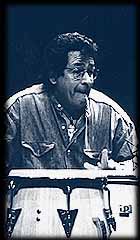
|
|
|
|
|
|
Photo Credit: Tim Owens |
Ray Baretto
Percussionist Ray Baretto combines rhythmic prowess with a melodic sense to achieve his unique and personal sound on the congas. Baretto has played a significant role in the cross-fertilization of Latin and jazz rhythms, following in the footsteps of the early Latin percussionists in jazz. On this show, he demonstrates his skills and explains the intricacies of Latin rhythm in jazz. An energetic audience at the Kennedy Center greets Baretto with resounding applause as he opens the show with Dizzy Gillespie’s "Tin Tin Deo". Baretto grew up in the Puerto Rican section of the Bronx, where traditional Latin music flourished. While in the army, he witnessed a performance by Dizzy Gillespie and Cuban percussionist Chano Pozo in Munich, Germany. Recalling this experience, he exclaims, "That’s why I’m here!" Pozo’s groundbreaking collaboration with Gillespie brought an exciting variety of Latin rhythms to the revolutionary bebop sound. After Pozo’s performance, Baretto tore the strings off a calfskin banjo to create a makeshift conga drum and began trying to play like him. Baretto’s sound is still influenced by Pozo today. For example, he tunes his congas down low when playing in a jazz ensemble. He feels that this approach complements the rhythm section by supporting the bass beat. Baretto also notes Candido’s influence on many Latin percussionists, as well as his impeccable timing and versatility. After demonstrating the difference between a straight ahead Latin rhythm and a Latin-jazz rhythm, Baretto joins Billy’s trio for a rousing rendition of Dr. Taylor’s tune, "Bit of Bedlam", which Candido himself once recorded. Baretto bought his first real conga drum after the army. He soon began playing in jam sessions in New York at places like The Paradise and The Apollo Bar, where he first met alto saxophonist Charlie Parker. Parker heard Baretto jamming on stage and asked him to stay on and play with him throughout his seven night engagement. Baretto recalls the thrill of that experience, "I spent a week jamming with Bird, and I was in heaven for seven nights." Baretto’s career took another leap forward later, when he joined Tito Puente’s band. Later, Baretto shares his experiences accompanying the different styles of Gillespie and Parker. Baretto says Gillespie’s phrasing was very rhythmic and would often lead the rhythm section as much as follow it. Parker’s style was freer, and he challenged the rhythm section with solos that overlapped between choruses. Baretto says, "Bird challenged you time-wise…like a bucking horse." Baretto then joins Billy’s trio for an upbeat rendition of Parker’s "Anthropology". Responding to questions from the audience, Baretto discusses the growing use of multiple congas by percussionists, and his preference for wooden rather than fiberglass drums. He also shares a laugh about being the first Hispanic rap artist with his early hit, "El Watusi", and talks about the current use of the term "salsa" to describe many traditional Latin rhythms. He then demonstrates some lesser known Latin rhythms.
Back on the bandstand, Baretto plays impassioned versions of Clare Fischer’s "Morning", Duke Ellington and Juan Tizol’s "Caravan", and Rogelio Martinez’s "Sun Sun Babae", before closing with Dr. Taylor’s own, "At the London House".
|
|
| |
